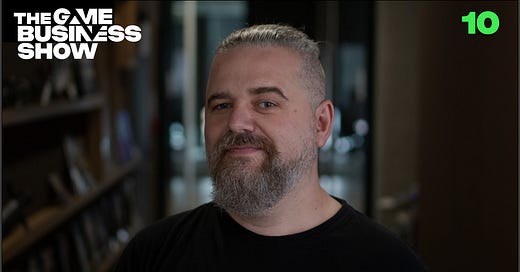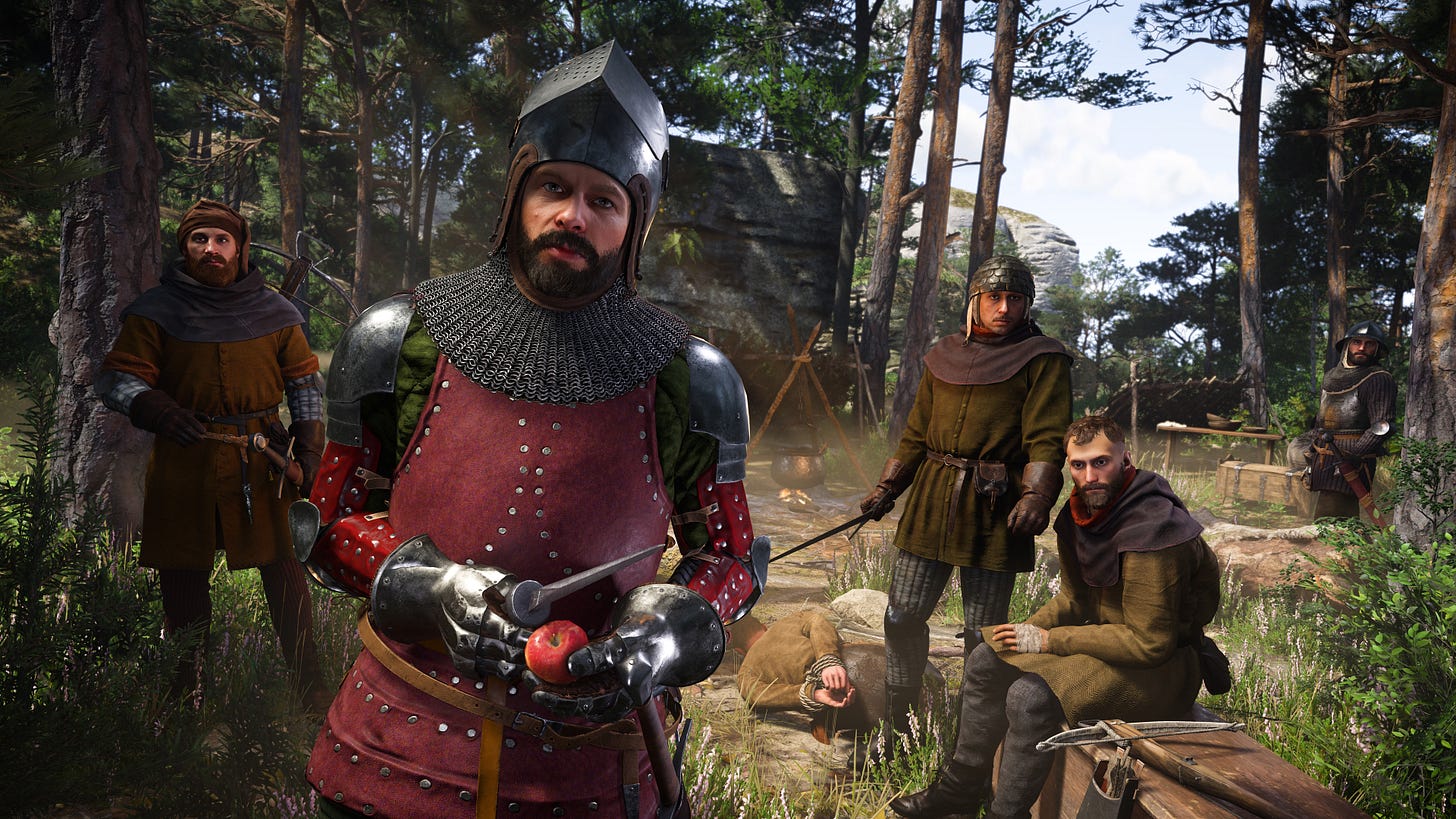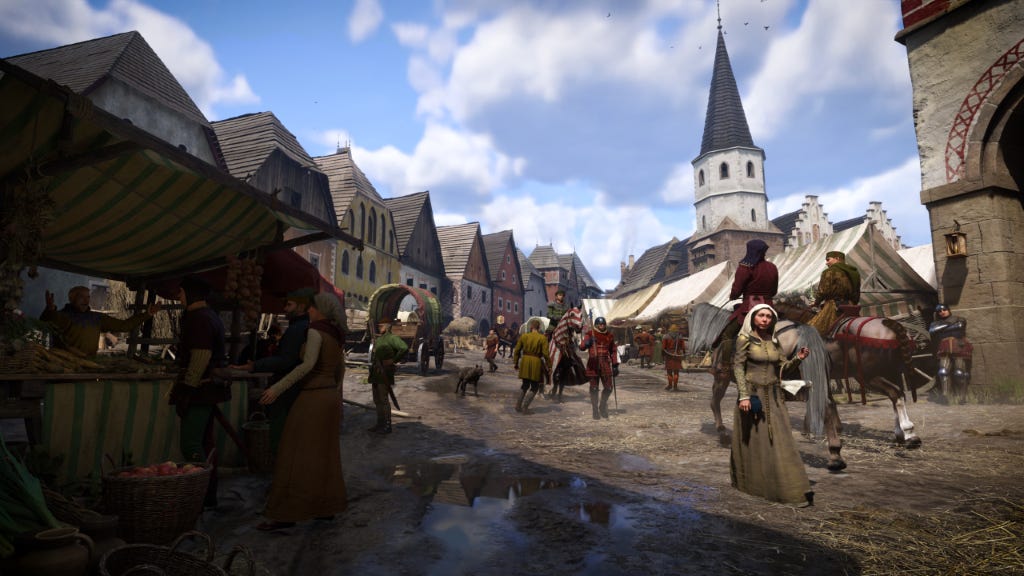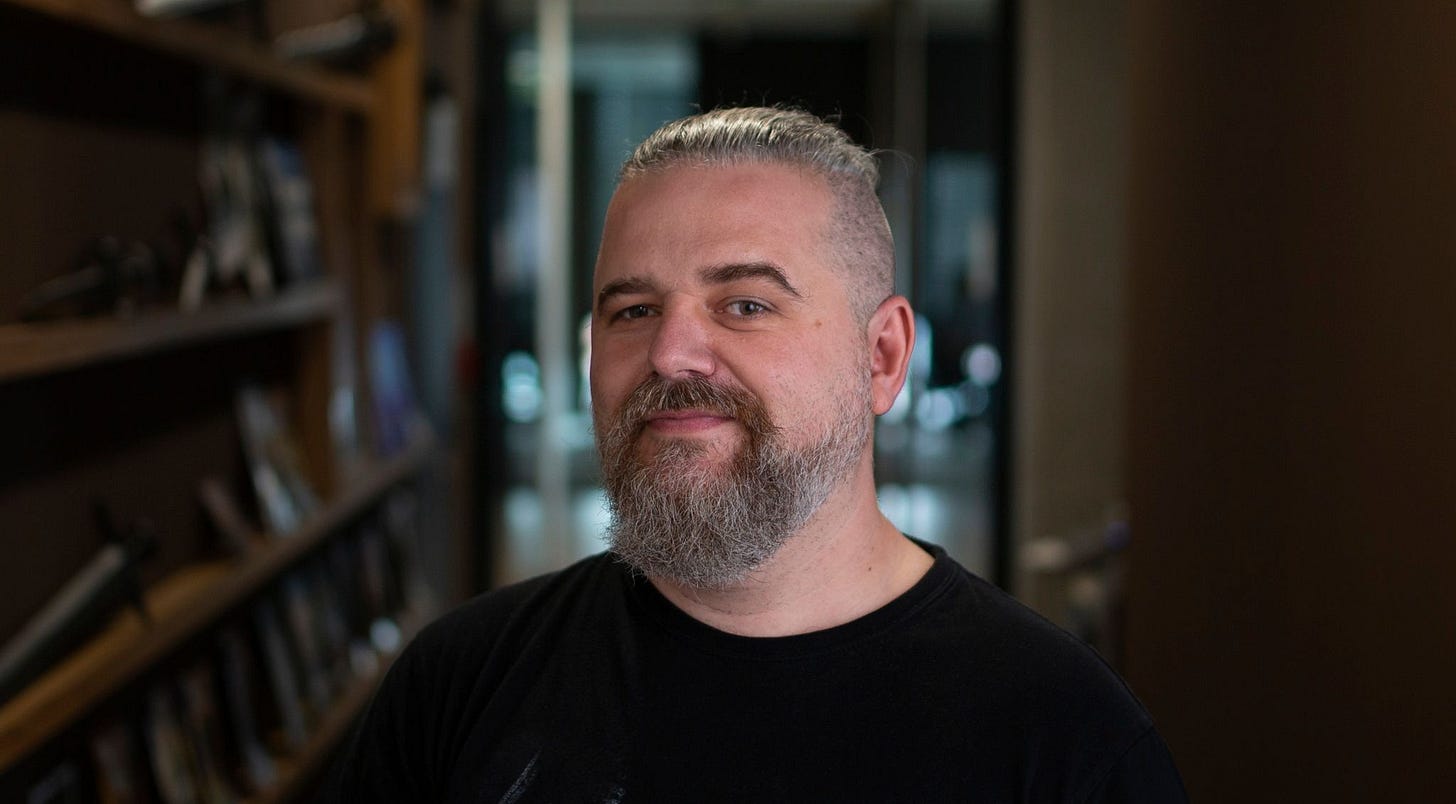Hello, and welcome back to The Game Business.
I’ve spent my weekend trying (and failing) to resist all the Easter chocolate in the house. Well, not just that, we’re coming up to our one-month anniversary of The Game Business Show and Newsletter, and so I’ve been crunching numbers to see how it’s all gone, and it’s been so much better than I had imagined. Thanks to all of you who have been engaging, sharing, reading, watching or listening. It’s been a genuine pleasure so far. I shall share more on Thursday.
Back to Business. Today, we have our Feature Show and Newsletter, which is an interview with Warhorse Studios co-founder Daniel Vávra, the man who directed and wrote the multi-million selling AAA action RPG Kingdom Come: Deliverance 2. Vávra has his opinions and has no qualms in sharing them, so I hope you enjoy the conversation above. Alternatively, I’ve selected all of the best quotes and put them below in handy article-form.
I hope you enjoy it.
What we learnt from our interview with Warhorse Studios’ Daniel Vávra
Daniel Vávra has opinions.
He is the writer, director and co-founder of Warhorse Studios, the Czech developer behind the smash hit open world RPG Kingdom Come: Deliverance 2. And his views have often found him in the headlines for reasons other than his video game, attracting ire from both sides of the political divide.
For our interview, I wasn’t particularly interested in discussing the culture wars (although he inevitably brought them up). Instead, I wanted to hear about his concerns surrounding the risk-averse nature of AAA game development, what video games can learn from Hollywood, and his take on the state of the market.
But most of all, I wanted to learn about Warhorse itself. Its debut game, Kingdom: Come Deliverance, has been a genuine hit with eight million copies sold. In the six years since, the studio has doubled in size to 250 employees, been acquired by Embracer and has just launched Kingdom Come: Deliverance 2, which hit two million sales in a matter of weeks and picked up an abundance of critical plaudits.
“I'm really surprised that so many people are surprised by the success of the game,” Vávra told me.
“Since the beginning, I was absolutely sure that it's a recipe for success if we do it right. I like similar games. There are very few of them. For some weird reason, nobody makes them that much anymore. Generally we are in the same genre as The Witcher or Red Dead Redemption. Actually, we pitched the game to publishers as Red Dead Redemption with a sword 14 years ago.
“It's a strong story, and that's where a lot of games today fail, in my opinion. The story has to be good, by which I mean cool characters that you can relate to. Many games today, when they have a story, it's just like some fill in, some random bullshit or they try to tell the player some message or something. And every time a game [like this one] is published, it becomes very successful. It's weird that very few people make them.”
Here is what we learned from our chat with Daniel Vávra.
In the end, the user score matters more than the critics
Kingdom Come: Deliverance 2 received very positive scores from the media upon its release, and it was enjoying a Metacritic score of over 90… until a couple of critics emerged that were not-quite-so-impressed, namely Eurogamer (which gave the game a respectable 3/5) and GamesHub (which scored it 2.5/5).
Vávra wasn’t happy to see the game dip below the 90 Metacritic score (it ended on 88), and took to social media to express his frustration. But now that the launch excitement has died down, and the user reviews are out (the game currently has a 94 rating on Steam), I had to ask… does it matter if a couple of writers weren’t quite so effusive?
“It doesn’t,” he admitted. “[Critical reviews] are important in the first days, because the people look at those numbers and then judge if they will buy the game. But when there are Steam reviews and user reviews… for me, and I believe for many people, it's much more important than [critical reviews]. Times have changed a lot.”
“We pitched the game to publishers as Red Dead Redemption with a sword 14 years ago.”
AAA games are often at risk of becoming “corporate products”
At the start of this article, Daniel Vávra talked about how surprised he was that there were not more games like Kingdom Come: Deliverance, The Witcher or Red Dead Redemption. Does he have any theories as to why?
“I have a theory, of course,” he said. “If you look at the movies, at least in the past, Hollywood studios [operate] very differently than games companies. You have producers who choose some script, then they try to find money, and then they assemble the team and give a lot of control to the director. Basically, the people who control everything is the director and the producer. And the producers often give chances to very young and sometimes inexperienced people. Bryan Singer was very young when he did the first X-Men, for example. They gave him a very important franchise. So Hollywood was, at least in the past, willing to risk, and to try to do new stuff with new people. And they knew that it's about a good director rather than some committee.
“While in games, you have a company and there is a board of people who are deciding stuff, and the director or writer is just one of them, and very often doesn't have the final word. And that makes it a much bigger risk that it will become, basically, a corporate product rather than a piece of art.
“This environment also repels creative people. A lot. For a big game that’s similar to ours or Red Dead Redemption, or whatever, you need a lot of money, a lot of resources… much more than for a typical movie. It takes much longer. You can shoot a movie very quickly, there's a lot of post-production, of course, but you assemble a big team for a short time. While in games you have a large team for years. This work-for-hire that works in Hollywood doesn't work in games industry. It comes all from that.”
Too many writers are writing for “non-existent audiences”
Vávra has a theory around why some recent AAA games have struggled (and, indeed, some modern movies, too), and it’s to do with the relatability of the stories.
“The cultural wars that are here… A lot of people think that it's some evil management that's forcing the creators to do something,” he began. “But I would say that it's the opposite. It's coming from the creators, actually. I would even dare to say that some companies are not liking it and don't know what to do about it.
“But we can see now, even in Hollywood, they are making movies sometimes for a non-existent audience. If you look at the old movies from the eighties or nineties. Spielberg movies like E.T., it's set in some small town with quite normal people. Everybody can relate to them. And when you look at a lot of movies today, they are about people from California, rich people very often, that have very different problems to normal people. I would say that the creators are making movies about themselves, or are using cliches that they see in other movies, and they stopped doing movies about regular people.
“I would love to see a movie from Montana, for example. I usually like it when there is a different setting. And the same can be applied to games. When you look at the games from the 1990s, the scale of topics and different genres were, I would dare to say, larger than today.”
Life under Embracer has been good
Warhorse was acquired by Embracer in 2019. Yet despite the turmoil that engulfed its owner over the past two years, which resulted in mass job cuts, studio closures and project cancellations, Warhorse has been largely left alone. And Vávra tells us that life under Embracer has been broadly positive for the studio.
“Lars [Wingefors], who is the [Embracer] CEO, is all about giving the studios a lot of freedom,” Vávra told us. “We have had a lot of trust and we could do basically whatever we wanted. There was almost zero outside influence on the creative decisions on the game. Which is great if it works, and when you are not insane. I understand that the corporation wants to have some control over the final product when it invests a lot of money, but generally we had a lot of freedom and it worked.”
“Lars [Wingefors], who is the [Embracer] CEO, is all about giving the studios a lot of freedom,” Vávra told us. “We have had a lot of trust and we could do basically whatever we wanted.”
Leading Warhorse in 2025 is complicated
At the last count there are 250 employees working at Warhorse, which means the studio has doubled in size during the six-year development cycle of Kingdom Come: Deliverance 2.
“There's much more bureaucracy,” Vávra said of Warhouse today. “All those sayings that when you hire more people it doesn't mean more work [gets done] are actually true. It's much more bureaucracy. Some of the things get even more complicated than when you have fewer people. When you know everyone, you can just do stuff by talking to people. Now all of a sudden you have meetings for everything and schedules and plans. It's definitely a slowdown. But I don't know the recipe how to make it less complicated. It just goes with the size of the project.”
He wants to see more risk in AAA
“I’m just guessing here, but when you have a company that spends like $200 million on a game, they do a lot of versions, and when they are not happy, they start from scratch, which makes the games expensive,” Vávra theorised around the challenges of AAA development.
“Maybe if they just make more $50 million games, three would be flop and one will make money, maybe. They are so afraid about the potential risks, that they spend a lot of money on everything and iterate too much, I would say. And then they could miss the ideal release date, times change and people don't like this genre anymore, or stuff like that. So being faster, cheaper and with more risk would probably could solve some of those issues.”
Vávra added that although the recent spate of studio closures and job losses has been bad on a human level, he hopes that some positives will come out of it in terms of how games are made.
“It will clean the waters, make people think about efficiently,” he said. “They will change directions with genres and will look at the industry with some fresh ideas. Hopefully the things we are talking about will change, that there will be more games that people want and more risk will be taken.”
He added: “Hopefully some people who lost the spirit because of how industry works will return or start new companies, and do new stuff. I would really welcome some fresh air and new stuff.”
He has lots of ideas, and hopes AI will mean he can make them
Vávra says that the last year was “really tough” for him working on Kingdom Come: Deliverance 2.
“I had some serious health issues from all the stress,” he told us. “I really need to slow down a little bit.”
However, he has a lot of ideas about the games he would like to make next, but is running out of time to do them. A problem that he hopes technology and AI will solve.
“It really annoys me that the games take so much time, because I have more ideas than I have time. There are a couple of projects that I would love to do. And I would love to prepare them properly, so it's not as chaotic. I hope that the AI revolution will help with this, where in the future we will not be replaced by AI, but we will be helped by AI. So a lot of the things could get easier and faster.
“It will be great if this would happen. I have a couple of big ideas that I would like to make that will require a lot of time and preparation […]. A couple of projects that, in my opinion, have as big potential as Kingdom Come: Deliverance.”
That’s it from us today. Join us on Thursday when we delve into some statistics around the state of video game media. Until then, have a great week.
















Share this post